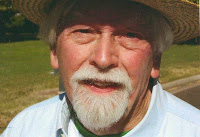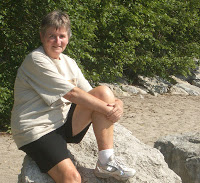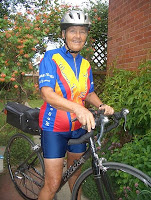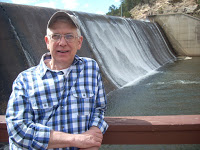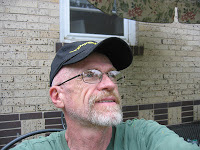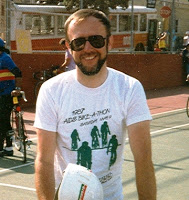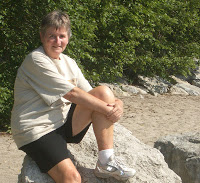With a great stretch of the imagination I just might be able to see myself having a momentary lapse of concentration and running into the burning building to rescue a baby. It would require my being carried away on a huge rush of adrenaline, plus the balance of my mind being temporarily disturbed, but it just might happen. Though, to be fair, I should add that this is more a statement a previous me might have made, rather than the current one. I cannot imagine myself actually running anywhere these days, and toddling into the flames does not ring with great promise.
The kind of heroism I can never envision for myself, however, is that which must endure: day after day, month after month, even year after year, perhaps for a lifetime. This kind of courage has always been around, still is, and, human kind being what it is, doubtless always will be. Those of our generation probably leap most easily to tales of derring-do from the Second World War for such stories of silent, unseen, unsung heroes. I don’t mean only the romantic figures of The Resistance, who certainly helped in the eventual Allied victory; but the many invisible, unseen, and mostly unheard-of men and women from all walks of life who risked their ordinary lives every ordinary day. Their names are unknown to most of us. Do you know the name of the owners of the attic where Ann Frank so famously hid? I don’t. Do the names Caecilia Loots, Irena Sendler, Giorgio Perlasca, Frank Foley mean anything to you; to me? Yet they are just four of the 26,000 people from 49 different countries to receive the honorific ‘Righteous Among Nations’; an award bestowed by Israel on non-Jewish people who saved Jewish lives during the holocaust. And that doesn’t count all the non-Jews saved from the Nazis. And just think how countless many other simple saviors there must have been, who have slipped unacknowledged into the past
Le Chambon-sur-Lignon was a Protestant village in a predominantly Roman Catholic region of southern France. The village became a hiding place for Jews from every part of Europe. Between 1940 and 1944, Le Chambon and other nearby villages provided refuge for more than 5,000 people fleeing Nazi persecution, about 3,500 of whom were Jewish. (The exact numbers are, understandably, uncertain.) For four years, these people went about their daily lives, acting normally, while every single day they were at risk of discovery which would doubtless lead to torture and eventual death. How did they do that, these silent, invisible, unsung heroes? Where do you find that kind of ceaseless courage? In this community, also of around 5,000 people, no-one gave away any secrets either on purpose or accidentally. In 1943, the Nazis offered a reward for the local Minister who had been forced to go into hiding. Most of the population, including many children, knew where he was, but nobody talked. The Minister’s cousin, who ran the local orphanage, was arrested in 1943 and sent to Buchenwald where he died. And still they continued their dangerous efforts. It was long after the war that this village’s exploits became known, and then no-one wanted credit. They did what they did, as did all those on the ‘Righteous Among Nations’ list, along with so many unknown others, for no other reason than it was the right thing to do.
Raised, as I was, in post-war Britain, I grew up with exaggerated, lurid, fiction versions of such heroic escape stories. Naturally, in my youth, I fantasized. I became my own secret, silent, unsung hero engineering miraculous escapes at great personal risk. But in reality I think I always questioned how brave I would really be under such circumstances. Would you really risk torture and death for others, strangers who meant nothing to you? I asked myself. Reluctantly, I was forced to face doubts as to my own courage.
Now, since the election of the Orange Oligarch, I unwittingly and unwillingly find that I am asking myself those same questions again – for the first time in over fifty years. No, I am not so far fallen into fear that I imagine myself facing some modern version of storm troupers and the gestapo. Though my insides do double back flips as I say that, so apparently I am not quite as sure of it as I would wish to be. Also, I am confident that most residents of Germany in the early 1930’s would have said the same thing, which does not exactly fill me with confidence for our future.
In fact, since the election, I have a general, unformed, non-specific, fear which manifests as a cold hard lump of ice somewhere deep in my gut. I know that it is actually made up of a myriad of ‘what ifs’, which for the most part I just ignore. I have struggled along in this life long enough to know that letting those ‘what ifs’ crowd my every waking moment is not in any way a good thing. I go on with my life. But that cold hard fear remains.
So perhaps it is better, once in a while, to look closely at those ‘what ifs’ and test their validity.
Perhaps, when waved about in the fresh air, they will disintegrate. Vanish. Gingerly I reach deep down into my psyche and bring them out.
There is an outer ring of somewhat general fears. What if, as seems increasingly likely, we start a war? Multiple wars? What if, as seems increasingly likely, we deny the reality of climate change? What if, as seems increasingly likely, our economy crashes in burning rubble about our feet? Or what if, as some pundits insist, the economy will grow exponentially under the guidance of the Orange Ogre: most people’s lives become better. Life is good. Then we’re back to Germany in 1933: a booming economy, a better life for all. Well, no, not for all. But let’s not notice who has to pay the price as long as we’re all doing so well.
Those are not the ‘what ifs’ which really haunt me. They are too big: too unmanageable, beyond my capacity to fix. All I can do is make phone calls, write letters, protest, and generally try to turn the oncoming tide.
But the inner layer of ‘what ifs’, they squeeze my very soul. They ask about me. What will I do?
I am in control of my responses. Will I be my own silent invisible unsung hero?
That can be as simple as voting for, or encouraging action that is, the right thing to do but against our better interests. A few days ago, one of the endless on-line petitions I was asked to sign was urging Mayor Hancock to make Denver a Sanctuary City, as so many in the U.S. have done.
To my shame, I hesitated. The ‘Orrible Orange has threatened to cut off all Federal Funding to communities so designated. I am not sure, without some research, what exactly that would mean. But I am sure that one of the fastest-growing cities in this country would certainly have to tighten it’s belt. I added my name. But the hesitation, over such a small thing, once again made me question the courage of my convictions.
When that list of Muslims becomes a reality, will I really, as I now so glibly promise, add my name to it without knowing the consequences? Or worse, when I know that there will be very dire consequences? Will I do my part to make the list as meaningless as the Danes made the Jew’s yellow star during the war, when everyone wore one?
I honestly don’t know.
When it is forbidden for Muslims to enter the Mosque, will I walk beside them facing being beaten or shot by the riot police? Or will I cower at home and stare in fear and shame at the stories unfolding on TV?
I honestly don’t know.
When Mike Pence, our bigoted, homophobic, VP, has pushed our legislators into outlawing any gathering of GLBT people, will this group continue? Will we meet right here in this room, waiting for the enforcers of the law to burst through that door, guns blazing; or at best to haul us all off to prison? Or will we continue to meet, but secretly, in a different location each week so we don’t get caught? And will I be with you? Or will I slink away silently into the darkness to hide, to keep my head down at home; not the silent invisible unsung hero of my dreams but the silent invisible non-hero of my ‘what ifs’?
I honestly don’t know.
Right now, my very best hope for the future is that I am never forced to find out.
© January 2017
About the Author
I was born and raised in England. After graduation from college there, I moved to the U.S. and, having discovered Colorado, never left. I have lived in the Denver-Boulder area since 1965, working for 30 years at IBM. I married, raised four stepchildren, then got divorced after finally, in my forties, accepting myself as a lesbian. I have been with my wonderful partner Betsy for thirty years. We have been married since 2013.
